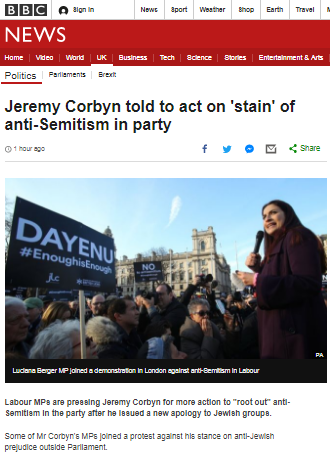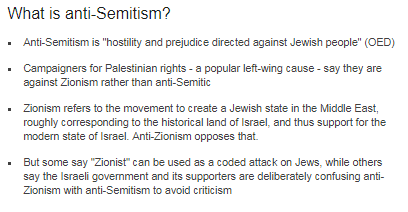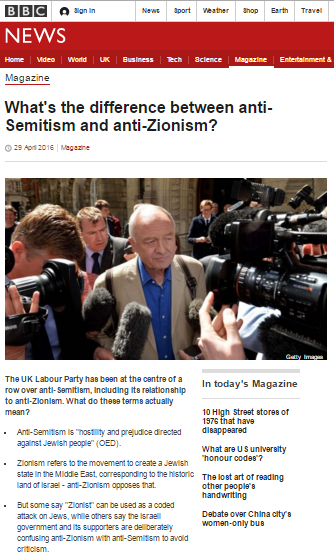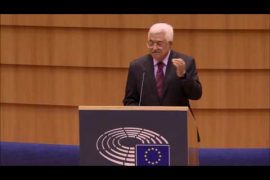On March 27th an article titled “Jeremy Corbyn told to act on ‘stain’ of anti-Semitism in party” was published in the ‘politics’ section of the UK page on the BBC News website.
Relating to the previous day’s protest organised by two British Jewish community bodies, the article includes an insert ostensibly intended to help readers understand the story.
Titled “What is anti-Semitism?”, the insert commences by giving a definition attributed to the Oxford English Dictionary.
“Anti-Semitism is “hostility and prejudice directed against Jewish people” (OED)”
BBC audiences are then told that:
“Campaigners for Palestinian rights – a popular left-wing cause – say they are against Zionism rather than anti-Semitic”
The insert goes on to give an explanation of Zionism which, notably, does not include the term self-determination.
“Zionism refers to the movement to create a Jewish state in the Middle East, roughly corresponding to the historical land of Israel, and thus support for the modern state of Israel. Anti-Zionism opposes that.”
Obviously an insert purporting to explain antisemitism to BBC audiences should have clarified that according to the IHRA working definition (adopted by the UK government, among others), opposition to the right of the Jewish people to self-determination in the Jewish state is defined as one possible manifestation of antisemitism.
“Denying the Jewish people their right to self-determination, e.g., by claiming that the existence of a State of Israel is a racist endeavor.”
Finally, the insert presents readers with a dose of the Livingstone Formulation:
“But some say “Zionist” can be used as a coded attack on Jews, while others say the Israeli government and its supporters are deliberately confusing anti-Zionism with anti-Semitism to avoid criticism”
As regular readers will be aware, this is far from the first time that the BBC has promoted the notion that “the Israeli government and its supporters” deliberately and dishonestly raise the issue of antisemitism in order to delegitimise criticism of Israel.
Neither is this the first time that the BBC has tried – and failed – to explain antisemitism and anti-Zionism to its audiences. Indeed, this insert was obviously for the most part recycled from the opening paragraphs of a ‘backgrounder‘ first published in April 2016.

In other words, in nearly two years of BBC coverage of the issue of antisemitism within the UK Labour party, audiences have not once been informed of the existence of accepted definitions of antisemitism which have already answered the question of whether anti-Zionism – i.e. the denial of the right of the Jewish people to self-determination – is an expression of antisemitism.
Moreover, it is obvious that even the high profile of the latest related story covered in this article did not prompt the BBC to come up with an accurate definition of its core issue.
Given the fact that the BBC still does not work according to an accepted definition of antisemitism and in light of its own record on that issue and its repeated failure to inform audiences what anti-Zionist groups such as the PSC and the BDS campaign really stand for despite frequently showcasing their agendas, that is perhaps hardly surprising.
But this insert does demonstrate once again is that the BBC is currently incapable of properly serving its funding public’s interests on this topic.
Related Articles:
IHRA adopts working definition of antisemitism: when will the BBC?
BBC News tries – and fails – to explain antisemitism and anti-Zionism
BBC article on antisemitism report recycles problematic backgrounder
BBC again ignores the existence of accepted definitions of antisemitism




